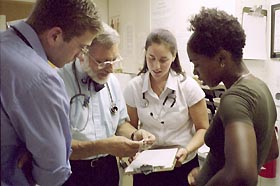|
This is an archived article.
For the latest news, go to the Advance
Homepage
For more archives, go to the Advance Archive/Search Page. |
||
|
South
Park Inn Clinic Services
Shelter Residents, Trains Students By Kristina Goodnough
The residents - men, women and children - can step into the clinic with their medical complaints and get the attention of not just one doctor but two, sometimes three, medical students as well. The clinic is popular with the students who come from the School of Medicine. So popular, in fact, that each student can only work there once or twice a year because so many others want to help out.
"It's a real-world experience that lets us do more and more as we become more comfortable," says Dr. David Shapiro, a surgical resident at the Health Center who worked with South Park Inn throughout his four years in medical school. More than 750 patients receive care every year at the South Park clinic. Each is seen by a student who takes a medical history, does a physical exam, and then confers with another student and with the supervising physician who is a volunteer from the community. "We see many of the same things that any primary care physician might see in his or her office," says Tyler Taigen, a fourth-year medical student who has worked at the clinic since his first year and is a member of the clinic's board of directors. "We see respiratory infections, skin infections, psychiatric issues like anxiety and depression. It's a great learning experience because you learn how to tailor your advice to the patient you're seeing." The clinic goes back to 1986, when a student doing a paper on how to set up a clinic as a public service approached South Park Inn, says Brian Baker, coordinator of South Park Inn: "He did his paper and I figured that would be the end of it, but the next semester a bunch of students came around and said they were going to open up the clinic." At first, the clinic was staffed with volunteer physicians from the community but it closed after a few months because there weren't enough volunteers. Then the students started staffing it, with a community physician for supervision. Mary Lovelock, co-executive director of South Park Inn, has been keeping a friendly eye on the clinic since it started in 1987. She says the clinic works well for all those involved. "The community doctors like it because they're supervising students. The students like it because they get to see patients with a wide range of ailments. The shelter residents like it because they get 20 minutes of undivided attention. The staff like it because if they're worried about someone they can help them get checked out." Dr. Bruce Gould, associate dean for primary care and a faculty advisor for the clinic, describes the clinic as "a double mentoring" program: "The doctors mentor the students in health care and the students mentor the doctors in why they went to medical school in the first place," he says. The students are responsible for recruiting the community physicians, arranging the schedules and managing the budget, as well as staffing the clinic. They also sponsor and organize an annual 5K road race to raise money for the clinic. Their work satisfies a community service requirement they must fulfill to graduate. "We have to do 15 hours of community service," says Taigen, "but most of us, especially those of us at South Park clinic, do way more than that." |
 ost Tuesday and Thursday evenings, the tiny clinic at
the South Park Inn homeless shelter is a very popular
place.
ost Tuesday and Thursday evenings, the tiny clinic at
the South Park Inn homeless shelter is a very popular
place.
